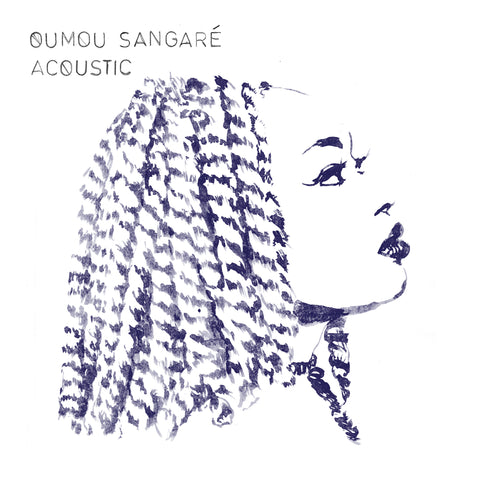Artwork - Jérôme Witz
From a photo by Benoit Peverelli
Graphic design - Element(s)
Oumou Sangaré - Lead Vocal
Guimba Kouyaté - Acoustic Guitar Benogo Diakité - Kamele Ngoni
Emma Lamadji - Background Vocals
Kandy Guira - Background Vocals
Vincent Taurelle - Célesta (1,5,9,10), Organ (2,7,8,9)
Recorded by Bertrand Fresel assisted by Philippe Coisne at Studio Midi Live
Mixed by Bertrand Fresel at studio Juno
Mastered by Adrien Pallot at Chab Mastering
All songs written and composed by Oumou Sangaré
Published by Nø Førmat!
En 2017 l'album Mogoya a marqué le grand retour d'Oumou Sangaré après 8 années à la faveur desquelles la chanteuse malienne s'est consacrée en priorité à gérer ses nombreux business (hôtellerie, agriculture, pisciculture, automobiles...). Dans ce disque enregistré entre Stockholm et Paris, entre attachement aux fondements de la musique traditionnelle du Wassoulou, province dont elle est originaire, et déracinement technologique, l'ancienne petite vendeuse d'eau des rues de Bamako, devenue star mondiale et femme d'affaire prospère, communiait à nouveau avec son public, lui ouvrait un coeur toujours aussi ardent, le gratifiait d'un chant animé d'une force vitale intacte.
En retour, Oumou s'est vue soudain propulsée dans une nouvelle dimension, celle de la pop culture. Peinte par l'artiste congolais JP Mika pour la pochette, remixée par Sampha, St Germain et autres Malik Djoudi pour l'album Mogoya Remixed, et même samplée par Beyonce (MOOD 4 EVA dans Le Roi Lion), jamais elle n'a paru à ce point éloignée de la terre qui l'a vu naître. Une impression que vient rectifier cette nouvelle version « unplugged » du même album voulue par Laurent Bizot du label No Format, magnifiquement assumée par l'artiste, où l'habillage acoustique des chansons restitue une authenticité que favorise le parti pris du premier jet, de la prise inaugurale, sans filet ni retouche. Soit la vérité d'un instant rare conjuguée à l'intensité émotionnelle qui s'en dégage. « J'ai proposé à Oumou l'enregistrement de cet album, qui est une sorte de 3ème volet de Mogoya, suite au concert donné à Londres à l'occasion des 15 ans de No Format où pour la première fois, quasi sans répétitions, elle a accepté cette formule acoustique très « lâcher prise ». L'espace ainsi créé pour sa voix m'avait beaucoup plu » raconte Laurent Bizot.
Le disque s'est fait en deux jours au studio Midi Live de Villetaneuse dans les conditions du live, ou plutôt celles d'une veillée, sans le confort qu'offre d'habitude pareil environnement technologique, sans amplification, sans re-recording, sans casque d'écoute, chaque musicien se mettant au diapason de l'ensemble tout en lui conférant sa touche personnelle, sa nuance. De cette égalité de traitement découle une dynamique d'ensemble et une chaleur devenues denrées rares dans la musique actuelle. Autour de la voix incandescente d'Oumou se sont ainsi rassemblés dans la même pièce les choristes Emma Lamadji et Kandy Guira, le guitariste Guimba Kouyaté et le fidèle Brahima « Benogo » Diakité, son cousin, virtuose du kamele ngoni, présent à ses côtés depuis Moussolou, première cassette de la chanteuse en 1989. À ce bref équipage est venu s'adjoindre à l'orgue jouet et au célesta, Vincent Taurelle membre du collectif parisien A.L.B.E.R.T qui avait tant contribué à la réussite de Mogoya et qui dans ce contexte strictement africain ajoute une note presque... exotique.
Les 9 chansons de Mogoya ainsi revisitées offrent à Oumou l'occasion d'évoquer sans détours, presque à voix nue, cette amère contrepartie à son exceptionnelle réussite que sont jalousies, rancunes et trahisons, tout ce que cette femme trop libre, transgressive et fortunée pour une société africaine profondément conservatrice a enduré depuis tant d'années. Loin d'entraver son élan, cet entrelacs de malveillances semble au contraire l'avoir stimulée, et incitée à renouer avec ce rôle éminent de leader d'opinion, de première influenceuse malienne endossé depuis Moussolou en 1989, cassette vendue à plus de 250 000 exemplaires qui a tant fait pour la cause féminine dans toute l'Afrique de l'Ouest. « Ils m'ont calomnié, ils m'ont attribué les pires défauts du monde » chante Oumou dans Yere Faga («suicide» en bambara), comme pour mieux se présenter en exemple de combattivité et de résilience. C'est de cette lutte sans merci contre préjugés et adversités en tous genres, dont elle est sortie vainqueur, que sont pétris Kamelemba (Play boy), Kounkoun (Mauvaises Graines) Mogoya (les Relations Humaines) et autres Bena Bena (L'ingratitude). C'est cette capacité à se battre, à affronter la souffrance, mais aussi à préserver des liens avec certaines valeurs essentielles de la société malienne (Fadjamou, Mali Nialé), qu'elle exalte dans ces chansons, ici proposées au naturel, sans fard ni surcharge. Un corpus de la volonté et de la revanche auquel elle a souhaité adjoindre deux compositions plus anciennes. Dans Saa Magni elle pleure Amadou Ba Guindo, membre de l'Orchestre National Badema qui fut l'un des artisans de son envol. Quant à Diaraby Nene, l'une des chansons les plus importantes de son répertoire, celle avec laquelle le scandale est arrivé, elle ose évoquer ses premiers émois sensuels. « J'ai écrit ce texte quand j'avais 15 ans, époque où je suis tombée amoureuse pour la première fois se souvient-elle. J'y parle sans retenue des caresses, de mes mains sur le corps de mon amant et des frissons que me procure le contact avec sa peau. » Chose inconcevable dans un monde où la réserve et la pudeur, en particulier s'agissant des femmes, sont de mise. A l'époque Diaraby Nene, extrait de Moussolou, bravait un interdit et faisait apparaître Oumou Sangaré comme une anti-griotte, une révolutionnaire devenue du jour au lendemain si populaire au sein de la jeunesse ouest africaine qu'elle allait pousser son avantage en dénonçant sans relâche l'excision, les mariages forcés et la polygamie, système qui fut à l'origine de l'effondrement de sa famille et qui continue de broyer des milliers vies.
Alors qu'elle est devenue une artiste installée, célébrée partout dans le monde, ces différents thèmes Oumou continue de les explorer aujourd'hui avec la même liberté, la même audace qu'à l'époque de cette première cassette sortie voici trente ans. Car c'est bien la battante, l'insoumise, la révoltée que l'on retrouve ici dans ce disque instantané qui, à une époque où la musique est devenue l'otage de manipulations numériques sans fin, apporte une preuve supplémentaire de son courage et de sa générosité. Ceux d'une artiste toujours en devenir, toujours à la pointe du combat pour l'émancipation de la femme africaine, par-delà tradition et modernité.




